ARTICLE AD BOX
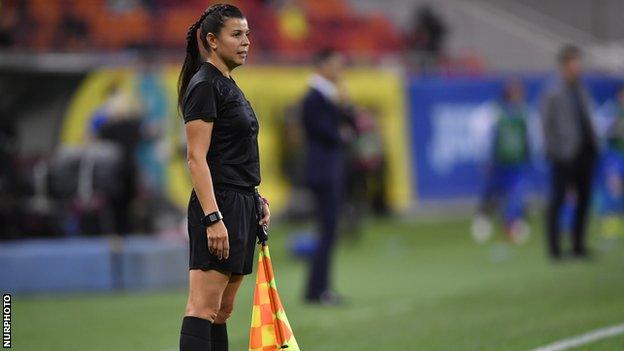 Maryna Striletska has been officiating in Switzerland's men's third tier to prepare for this summer's Euros
Maryna Striletska has been officiating in Switzerland's men's third tier to prepare for this summer's EurosMaryna Striletska's life was turned upside down one morning in February when she woke to find her dogs barking and her husband weeping in front of the television.
"I'll never forget the moment," she tells BBC Sport. "He was watching the news with tears in his eyes and said 'the war has started'."
One of Ukraine's top assistant referees, Striletska had made history just four months earlier as part of the first all-female team to oversee an England men's international.
But that World Cup qualifier between Gareth Southgate's side and minnows Andorra at the Estadi Nacional felt like a world away as army vehicles rolled through her village, 19 miles from the Russian border.
"In the first day, for 24 hours, trucks and military cars came through," she recalls. "The Russian army were friendly, asking us which way to Kyiv.
"They thought we needed help, brought flowers and bread, but after a week they realised we didn't want this help. After that they started to be angry and started shooting civilian cars and I thought maybe I want to leave."
Eventually, Striletska did exactly that, packing her belongings into just one bag and setting out on an arduous dash to safety in Switzerland.
Since then, the 38-year-old has taken up her flag again as an assistant referee in the Swiss men's third division. Next month, she will arrive in England to officiate at the Women's Euros.
The refereeing family has thrown the Ukrainian trailblazer a lifeline. But speaking on Zoom from the bedsit she now shares with her daughter Eva in Basel, she says her outlook on life has changed forever.
'The referee world is like a big family'
Raised in Luhansk, Striletska was more interested in athletics than football as a teenager, but she combined the two at university and played on for six years after her graduation.
"I ran like a crazy horse because I was doing athletics," she says. "I wasn't so good with the ball, but I like running!"
The former midfielder was persuaded to put her athleticism to a new use in 2006, when the Ukrainian FA sought to recruit female referees in each of the country's 24 regions.
"In that time, we had maybe 10 girls in Ukraine refereeing, so each federation decided to find one girl," she says. "They asked me and at the time I was not so happy, but I tried."
Today, Striletska is one of a raft of top-drawer Ukrainian female officials, who include the first woman to referee in the country's men's Premier League, Kateryna Monzul.
Striletska has assisted Monzul in the women's World Cup, Olympics, Euros and Champions League, as well as the men's Europa League, Nations League and under-21 European qualifiers.
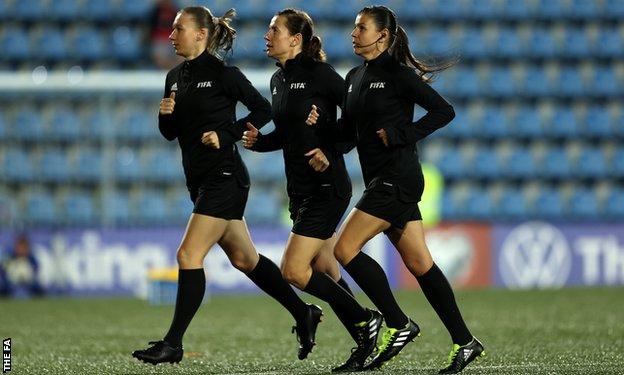 Maryna Striletska (right) alongside Kateryna Monzul (centre) and Svitlana Grushko before England's men's World Cup qualifier with Andorra
Maryna Striletska (right) alongside Kateryna Monzul (centre) and Svitlana Grushko before England's men's World Cup qualifier with Andorra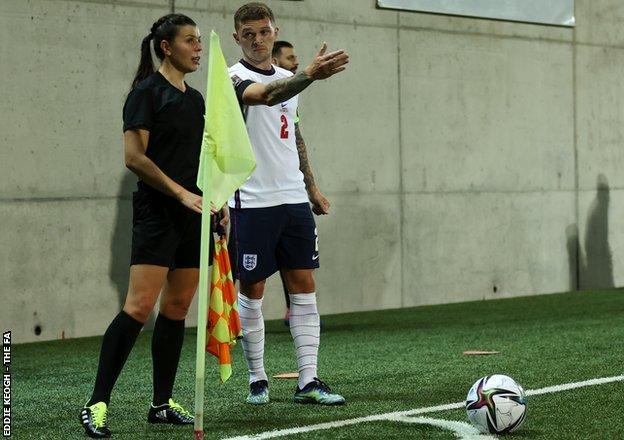 Maryna Striletska was part of the first all-female referee team to oversee an England men's international
Maryna Striletska was part of the first all-female referee team to oversee an England men's international"It's our team, Kateryna, me and Oleksandra [Ardasheva] or Svitlana [Grushko]," she says. "This is a small team, a small family. It's really like sisters.
"But now, since the war has started, I'm seeing that the referee world is like a big family and I feel I am part of that; people want to help."
'For three weeks I cried every day'
It was mid-March when Striletska finally decided to heed the advice of her sister in Switzerland and flee war-torn Ukraine.
The home life she had known - weekends working as an assistant or video assistant referee in the Ukrainian men's Premier League and evenings coaching two girls' teams - was already over.
But the constant fear of bombing from low-flying planes as they roared over her house and concerns for 11-year-old Eva's safety had begun to take its toll.
So, Striletska packed her daughter, a friend's wife and their two children into a car and set off for Poland, sitting at the wheel for hours at a time to beat nightly curfews.
"It was difficult because all the road signs had been taken down," she says. "We had to hide in a village on the journey while we waited for tanks to pass through.
"One time we went to a church and slept on the floor, I'd driven for 18 hours and just wanted to sleep. At 6am we would start again.
"It took me four days. After we got to the border we were queuing for 17 hours, but then after that it was easy - I felt we were safe."
Striletska could only hope that her husband and fellow football coach, Sergiy, would be safe as he had to stay behind.
"He will defend our home because for us it is a second time," she says. "We used to live in Donbas and in 2014 we lost everything and I never saw my parents again before they died."
Reunited with her sister in Switzerland, Striletska initially struggled to think about anything apart from her husband and the war, but football has given her an outlet.
"For three weeks I cried every day," she says. "I was forgetting I was in the world of football because I was thinking about the war. That's why I had to start refereeing."
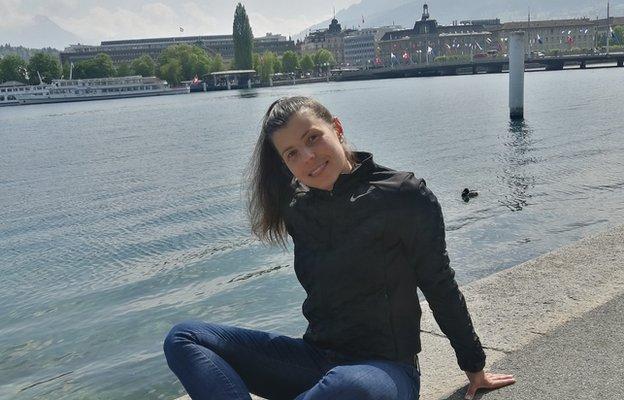 Maryna Striletska says she is grateful for all the help she has received since arriving in Switzerland
Maryna Striletska says she is grateful for all the help she has received since arriving in SwitzerlandStriletska says the Ukrainian FA, having offered to help all its referees, contacted their Swiss counterparts on her behalf; they gave her matches in the men's third tier Swiss Promotion League.
"I'm so thankful for this because the Swiss federation have given me a lot of games," she says. "It helps because at least for two hours I can forget about the war and just see defenders, attackers, offsides!"
'Enjoy the moment'
With her daughter settling in school, Striletska has been spending her days following her Fifa fitness programme and learning German.
"Switzerland are doing a lot for Ukrainian people, all museums, trains, buses are free for us," she says. "I really can't thank this country enough, they've even organised a free language course for us."
Despite her gratitude, Striletska is desperate for a speedy return to her homeland. For now, though, she stays in touch through the internet.
"Now our region is more or less normal, the Russians have gone to Donbas and the east," she says. "Sometimes my husband says they hear explosions, but not like it was before. Even our sports hall starts work and I'm doing training sessions with the girls online."
Another morale boost is the call-up for a second women's Euros alongside Monzul, who also left Ukraine and has since refereed in the women's Serie A in Italy.
"I was really happy to get the news about the Euros," Striletska says. "It's an unbelievable feeling, I can forget about the war and I'm looking forward to us working together again."
The two were last in the UK in November for Arsenal's Women's Champions League tie with Danish side HB Koge in Borehamwood, then England's Women's World Cup qualifier with Austria at the Stadium of Light.
Striletska's life has changed beyond recognition since then, and so have her values.
"After this I realise you don't need a lot in life," she explains. "Money is not important, the most important thing is relations between people.
"People are helping me, talking to me, bringing fruit for my daughter, small things but helpful, and these are the things that are important in our life.
"We're always trying to reach higher, work harder, buy things, but really, you just need to enjoy the moment."

 2 years ago
38
2 years ago
38

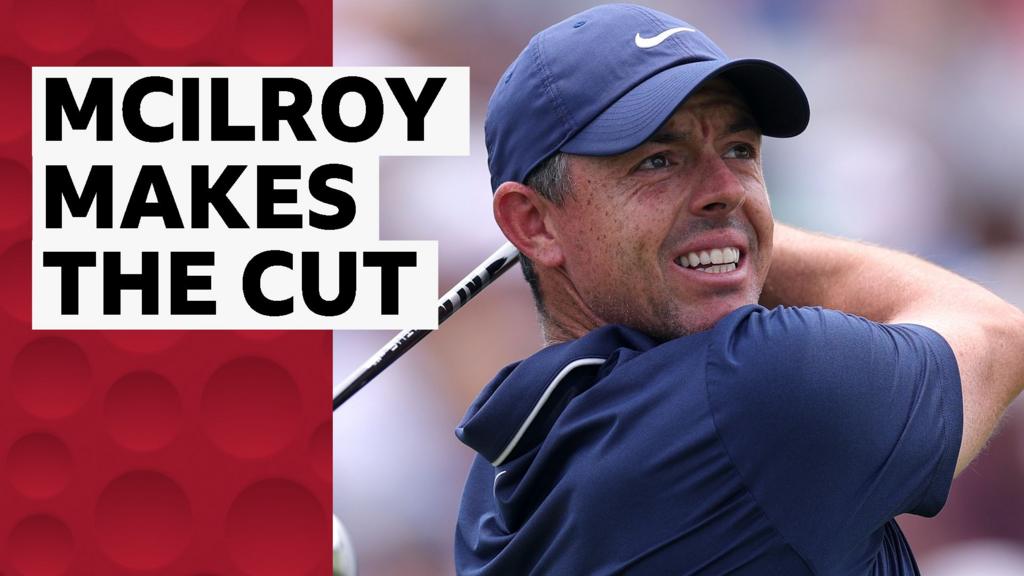
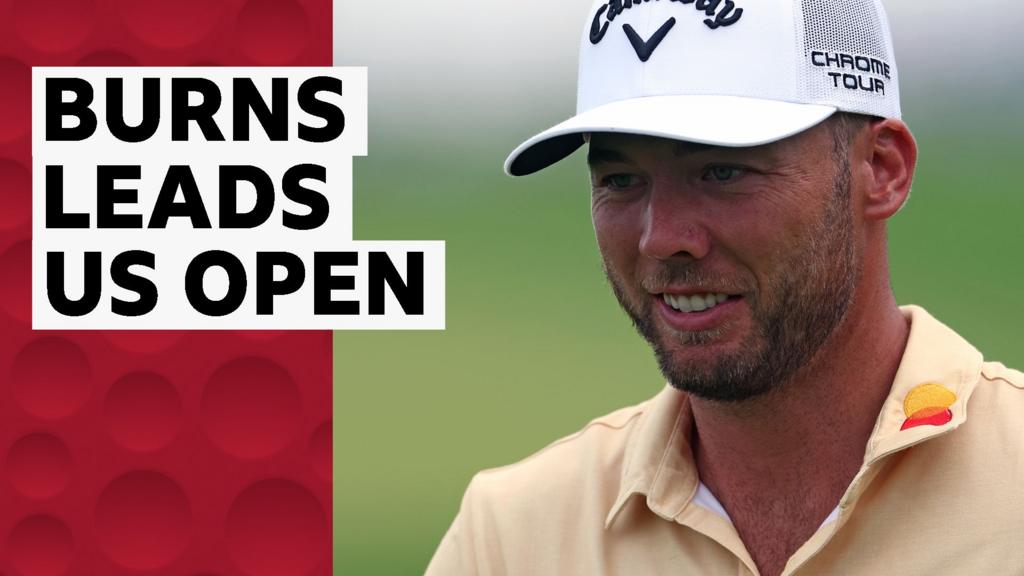





 English (US) ·
English (US) ·